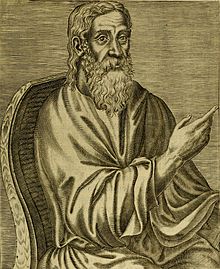Clemente ng Alehandriya
 Clement depicted in 1584 | |
| Ibang mga pangalan | Clement Alexandrine |
|---|---|
| Ipinanganak | Titus Flavius Clemens c. 150 CE Athens, Achaia, Imperyong Romano |
| Namatay | c. 215 CE Jerusalem, Syria Palaestina, Imperyong Romano |
| Panahon | |
| Rehiyon | Kanluraning Pilosopiya |
| Eskwela ng pilosopiya | |
| Mga pangunahing interes | Teolohiyang Kristiyano |
| Mga kilalang ideya | |
| Mga institusyon | Eskwelang Kateketikal ng Alehandriya |
Naimpluwensiyahan ni
| |
Nakaimpluwensiya kay
| |
Si Titus Flavius Clemens o Clemente ng Alehandriya (Sinaunang Griyego: Κλήμης ὁ Ἀλεξανδρεύς; c. 150 – c. 215 AD),[5] ay isang teologong Kristiyano at pilosopo mula sa Alehandriya, Ehipto na nagturo sa Eskwelang Kateketikal ng Alehandriya. Kabilang sa kanyang mga estudyante sina Origen at Alejandro ng Herusalem. Siya ay isang akay sa Kristiyano at isang edukadong tao sa Sinaunang Pilosopiyang Griyego at panitikang Sinaunang Griyego. Siya ay naimpluwensiyan ng Pilosopiyang Helenestiko lalo na nina Plato, mga Stoiko, estoresisismo at Gnostisismo.[6] Sa isa sa kanyang mga akda, kanyang ikinatwiran na sina Plato at Pythagoras ay tinuruan ng mga iskolar na Ehipsiyo.[7] Siya ay itinuturing na isa sa Mga ama ng simbahan at pinipintuho bilang santo sa Simbahang Ortodoksong Koptiko, Katolisismong Silanganin, Kristiyanismong Etyopiko at Anglikanismo. Siya ay isang santo hanggang 1586 at ang kanyang pangalan ay inalis sa Martirolohiyang Romano ni Papa Sixto IV sa payo ni Baronius. Itinigil ng Simbahang Silangang Ortodokso ang pamimintuho kay Clemente bilang santo noong ika-10 siglo.
Mga sanggunian
[baguhin | baguhin ang wikitext]- ↑ Bromiley, Geoffrey William, pat. (Oktubre 29, 1979). The International Standard Bible Encyclopedia. Wm. B. Eerdmans Publishing. ISBN 9780802837813. Inarkibo mula sa orihinal noong Hulyo 29, 2020. Nakuha noong Disyembre 31, 2019 – sa pamamagitan ni/ng Google Books.
{{cite book}}: CS1 maint: date auto-translated (link) - ↑ "Clement of Alexandria: Stromata, Book 6, chapter VI". www.earlychristianwritings.com. Inarkibo mula sa orihinal noong 2019-07-25. Nakuha noong 2019-08-03.
{{cite web}}: CS1 maint: date auto-translated (link) - ↑ The Birth of Purgatory. University of Chicago Press. 1984. p. 52. ISBN 9780226470832.
to say a few words about the two Greek "inventors" of Purgatory, Clement of Alexandria
{{cite book}}: CS1 maint: date auto-translated (link) - ↑ Clement of Alexandria. The Stromata (Book VII). Newadvent.org. Inarkibo mula sa orihinal noong Oktubre 19, 2021. Nakuha noong Hunyo 23, 2021.
{{cite book}}: CS1 maint: date auto-translated (link) Chapter 2: "[A]ll men are His; some through knowledge, and others not yet so; and some as friends, some as faithful servants, some as servants merely. This is the Teacher, who trains the Gnostic by mysteries, and the believer by good hopes, and the hard of heart by corrective discipline through sensible operation. ... And how is He Saviour and Lord, if not the Saviour and Lord of all? But He is the Saviour of those who have believed, because of their wishing to know; and the Lord of those who have not believed, till, being enabled to confess him, they obtain the peculiar and appropriate boon which comes by Him. ... [N]ecessary corrections, through the goodness of the great overseeing Judge, both by the attendant angels, and by various acts of anticipative judgment, and by the perfect judgment, compel egregious sinners to repent." - ↑ Buell (1999), p. 10 Naka-arkibo 2020-07-29 sa Wayback Machine.
- ↑ Outler (1940), p. 217
- ↑ Press (2003), p. 83
